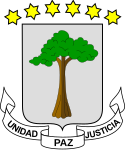 |
|---|
The Ministry of Justice, Worship and Penitentiary Institutions of Equatorial Guinea handles responsibilities such as overseeing the country's bar association, creating judicial rules and procedures, and investigating human rights issues. [1] [2]
 |
|---|
The Ministry of Justice, Worship and Penitentiary Institutions of Equatorial Guinea handles responsibilities such as overseeing the country's bar association, creating judicial rules and procedures, and investigating human rights issues. [1] [2]
The Ministry of Justice (MoJ) of Malawi provides legal advice and services to the government's ministries and departments, as well as the general public. The Ministry represents the government in civil litigation cases and prosecute criminal cases on behalf of the State, drafts legislation, and vets agreements and treaties on behalf of the government. The Ministry of Justice and Constitutional Affairs contains the following departments:
The Ministry of Justice and Institutional Transparency of Bolivia is in charge of the justice sector of Bolivia. In addition. the ministry includes the following vice-ministries:
The Ministry of Justice of Benin provides public safety and legal services that "promote the rule of law, ensure the safety and security of the public and uphold the interest of the government and people of the Republic of Benin." According to Article 6 of the Law on the Statute of the Judiciary, the Minister of Justice is the direct superior of the Magistrates of the Public Prosecutor's Office and the Central Administration of the Ministry of Justice. With reference to past records, the minister's title has been Minister of Justice and Legislation and Minister of Justice, Legislative Affairs and Human Rights.
The Ministry of Justice, Human Rights and Civic Promotion, Keeper of the Seals of Burkina Faso is responsible for the following:
The Ministry of Justice of Burundi performs tasks such as the following:
The Ministry of Justice and Human Rights of Chad is structured in the following manner:
The Ministry of Justice, Islamic Affairs, Public Administration and Human Rights handles any legal reforms that might improve the justice system of Comoros. The Union government forces include the Army of National Development and the gendarmerie. When the latter force serves as the judicial police, it reports to the Minister of Justice. Although National Commission for Preventing and Fighting Corruption (CNPLC) exists to prevent corruption, the Ministry of Justice seldom prosecutes corruption cases.
The Ministry of Justice & Penal Affairs of Djibouti is responsible for disciplining the courts, providing access and general justice, creating penitentiary policy, and handling human rights issues. In addition, the ministry develops regulations that pertain to criminal, civil and administrative matters.
The Ministry of Justice and Human Rights of the Central African Republic is responsible for providing justice for the government and the nation's citizens. In addition, the ministry oversees the operations of the Special Criminal Court to ensure that genocide and war crimes that were committed after January 1, 2003 are properly prosecuted.

The Ministry of Justice and Human Rights of the Democratic Republic of Congo (Congo-Kinshasa) has the following duties:
The Ministry of Justice and Legal Affairs is a ministerial department of the government of Antigua and Barbuda. The Minister of Justice simultaneously serves as the Attorney General.
The Ministry of Justiceand Human Rights of Ivory Coast is a department of the government of Ivory Coast. According to statute, the ministry audits the judicial hierarchy via its Central Administration unit, and executes a rating and appraisal system to determine which judicial officer will advance in rank. The ministry also has other responsibilities such as overseeing the National Chamber of Bailiffs of Ivory Coast.
The Ministry of Justice and Constitutional Affairs of Eswatini oversees the administration of justice through the various courts. The ministry has responsibilities such as the following:
The Ministry of Justice and Border Control of Nauru upholds the Constitution, provides legal advice to the federal government and represents the interests of the country in civil and criminal matters. It is divided into six sections:
The Attorney General's Office, Ministry of Justice, Human Rights and Institutional Reforms of Mauritius provides legal and legislative drafting services to the government of Mauritius. The Attorney General's Office interacts with the Legislature, Judiciary (Courts) and the Executive (Government/Ministries) branches, as well as provides assistance to the courts based on the powers vested in the office.
The Ministry of Justice of Guinea-Bissau has duties such as overseeing the administration and human resources of the judiciary and the Public Prosecutor, publishing and disseminating legal information to the public, and combating organized crime and drug trafficking that might threaten the safety of the country's citizens and impact the justice system.
The Ministry of Justice of Mauritania is responsible for sector Policy planning, Juvenile justice and Judicial reform, Drafting and distributing legislative texts, and Prison Administration.
The Ministry of Justice of Papua New Guinea and Department of Justice & Attorney General acts as the principal advisor to the government on all legal matters and is responsible for all civil litigation matters by and against the state. The Minister of Justice gives opinions on any questions relating to the interpretation or application of the laws of Papua New Guinea including the Constitution, Organic Laws, Acts of Parliament and all other subordinate legislation. The ministry oversees the following institutions:
The Ministry of Justice, Internal Administration and Human Rights of São Tomé and Príncipe has certain responsibilities such as overseeing the São Tomé and Príncipe land registry, property registry, and prison system.